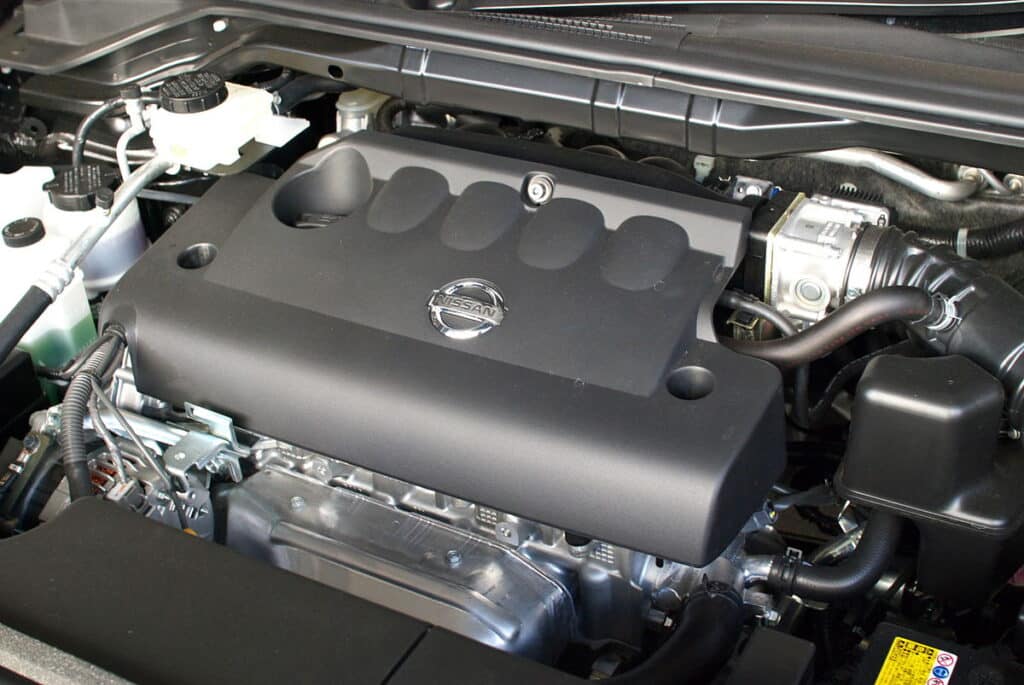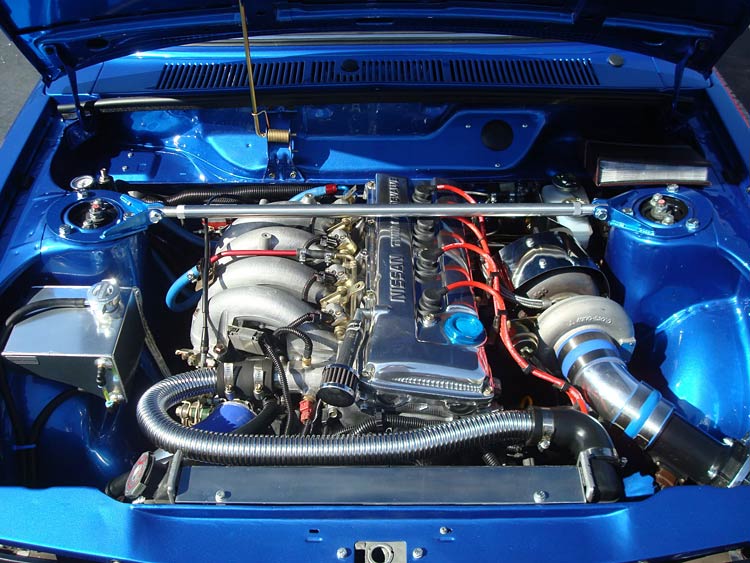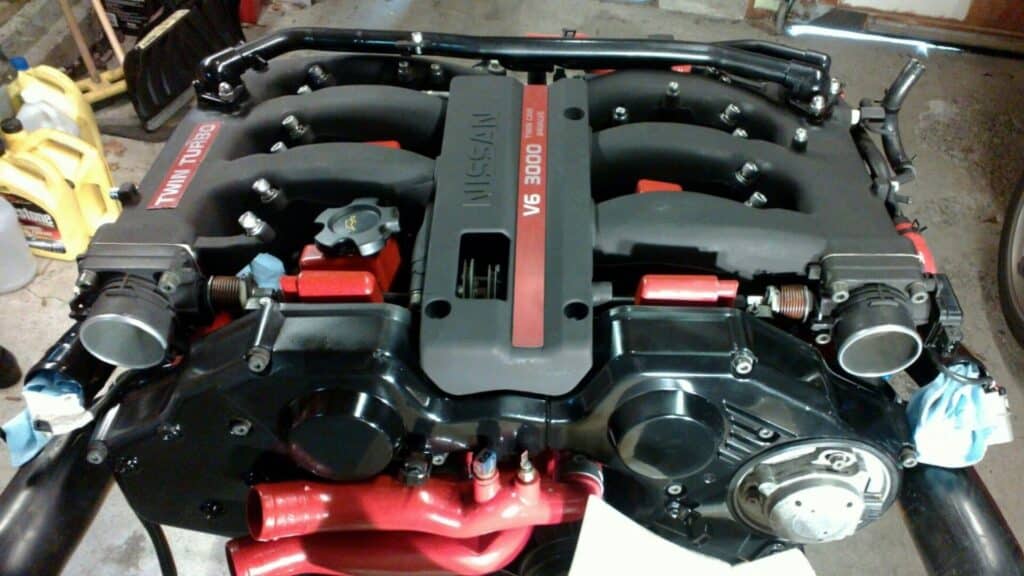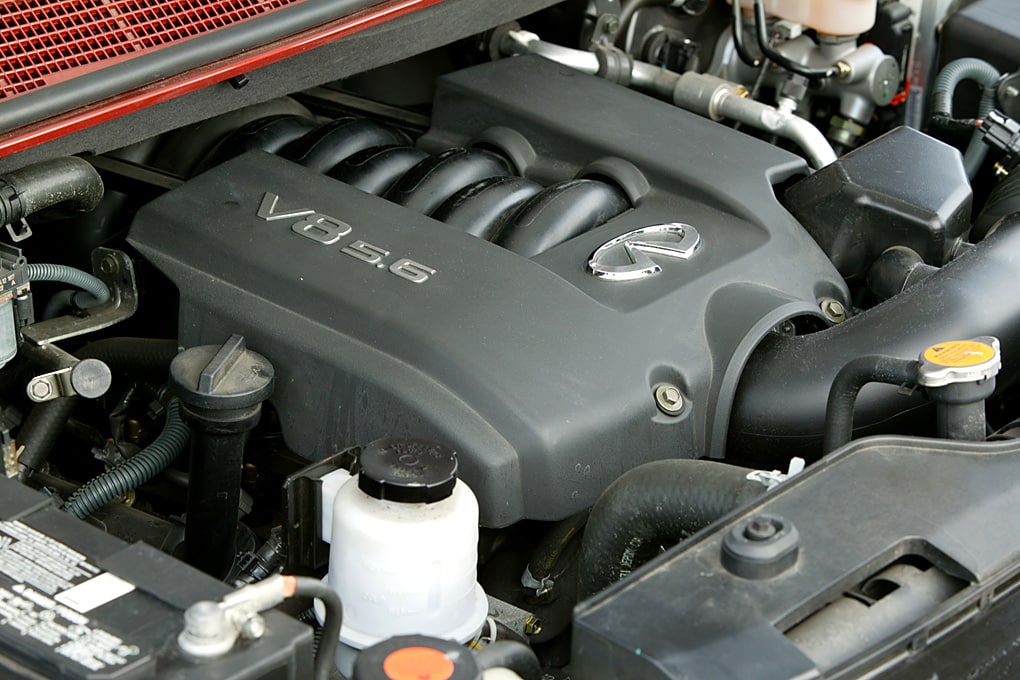The SR20DET is a 2.0-liter, inline-four engine with a turbocharger and electronic fuel injection. Introduced by Nissan in the early 1990s, it quickly became a preferred choice for those looking to extract maximum power from a compact engine. The “DET” in its name stands for “Dual Overhead Camshafts,” “Electronic Fuel Injection,” and “Turbocharged,” a testament to its advanced features for the time. With a robust block and an appetite for upgrades, this engine is not just a piece of machinery; it’s a canvas for mechanical artistry.
Understanding the heart of your vehicle—the engine—is crucial for any car owner. Knowledge is power, and in the case of the SR20DET, this statement rings especially true. Knowing your engine’s specifications, maintenance needs, and potential issues can greatly enhance its performance and longevity. Whether you’re keeping your ride purring like a kitten or pushing it to roar like a lion, familiarizing yourself with the intricacies of your SR20DET is the key to unlocking its full potential.
The breakdown of the engine code is as follows:
- SR – Engine Family
- 20 – 2.0 Liter Displacement
- D – DOHC (Dual Overhead Camshafts)
- E – Electronic Fuel Injection
- T – Turbocharged
The Lack of the letter “D” on some of the engine identifications indicates a SOHC cylinder head.
Nissan SR20DET Engine Overview
The Nissan SR20DET engine boasts a storied legacy that began in the early 1990s, quickly becoming the heartthrob of the tuner community. With its debut in the iconic Nissan Pulsar GTI-R, this turbocharged 2.0-liter engine demonstrated versatility and power, characteristics that cemented its status as a performance icon.
As it evolved, the SR20DET found a home in various Nissan models, each benefiting from its robust 200-plus horsepower capabilities.
Esteemed for its high ceiling for tuning, the SR20DET propelled vehicles like the classic 180SX and Silvia, revered for their drift capabilities, as well as the European 200SX and the North American 240SX. The engine’s design, featuring an aluminum block and dual overhead cams, allowed for a strong base that enthusiasts and racers alike could build upon.
The SR20DET’s widespread use across various models is a testament to its adaptability and the pivotal role it played in the tuner culture of the 90s and beyond.
SR20DET Specs
The Nissan SR20DET is an engineering feat that showcases the pinnacle of 90s Japanese performance engines. Let’s delve into the specifics that make this engine a tuner’s dream.
The SR20DET is robust and versatile, built to deliver power and reliability. Here’s a comprehensive table of its specifications:
| Specification | Detail |
|---|---|
| Displacement | 1998cc (2.0 Liter) |
| Configuration | Inline-4 |
| Bore x Stroke | 86mm x 86mm |
| Compression Ratio | 8.5:1 – 9.5:1 (varies by model) |
| Power Output | 205-250 hp @ 6000 rpm (varies by model and year) |
| Torque | 203-220 lb-ft @ 4000 rpm (varies by model and year) |
| Turbocharger | Garrett T28 (varies by model) |
| Valvetrain | DOHC with 4 Valves per Cylinder |
| Fuel System | Electronic Fuel Injection (EFI) |
| Engine Management | Nissan ECCS (Electronic Concentrated Control System) |
| Compression pressure | |
| Standard | Red Top and Black Top: 12.5 kg/m2 (178 psi) / 300 rpm Roller Rocker: 13.0 kg/m2 (185 psi) / 300 rpm |
| Minimum | Red Top and Black Top: 10.5 kg/m2 (149 psi) / 300 rpm Roller Rocker: 11.0 kg/m2 (156 psi) / 300 rpm |
| Compression differential limit between cylinders | 1.0 kg/m2 (15 psi) / 300 rpm |
| Oil system | |
| Oil consumption, L/1000 km (qt. per mile) | up to 0.5 (1 qt. per 1200 miles) |
| Recommended engine oil | To positively improve fuel economy: 5W-30 For warm and cold areas: 10W-30 For hot areas: 20W-40 and 20W-50 |
| Oil type API | SF, SG, SH, or SJ |
| Engine Oil Capacity (Refill capacity) | With filter change 3.4 l Without filter change 3.2 l |
| Oil change interval, km (miles) | 5,000-10,000 (3,000-6,000) |
| Oil Pressure, kPa (kg/cm 2, psi) | Idle speed: More than 78 (0.8, 11) 3,200 rpm: 314-392 (3.2-4.0, 46-75) |
| Ignition system | |
| Spark plug | Standard: BKR5E-11 (NGK); RC10YC4 (Champion) Hot: BKR4E-11 (NGK) Cold: BKR6E-11 (NGK) |
| Spark plug gap | 1.1 mm (0.043 in) |
| Spark plug tightening torque | 20-29 Nm; 2.0-3.0 kg·m; 14-22 ft-lb |
Understanding SR20DET Horsepower Ratings
The horsepower ratings of the SR20DET vary depending on the model and the year of manufacture, typically ranging from 205 to 250 hp. This variability is due to the different turbochargers used, intercoolers, and engine management systems that came with the specific vehicles it was installed in.
The higher performance variants were often seen in the later models, which benefited from Nissan’s continuous improvements in turbocharging technology.
The SR20DET Engine Firing Order Explained
The firing order for the SR20DET engine is 1-3-4-2. This is the sequence in which each cylinder goes through its power stroke, starting with cylinder one. The firing order is critical for the engine’s smooth operation and has been optimized to reduce vibration and increase efficiency.
Turbocharging and Performance Upgrades
At its core, the SR20DET was designed with turbocharging in mind, which significantly increased its power output over the naturally aspirated SR20DE. The turbocharger model, typically a Garrett T28, can vary with the engine’s application, contributing to the different horsepower ratings across models.
Enthusiasts often upgrade the turbocharger, intercooler, and fuel injectors for even greater performance, and the SR20DET’s strong internals and adaptable ECU make it receptive to such modifications.
The aftermarket provides a wealth of options for those looking to push the engine further. From high-flow exhaust systems and advanced engine management units to fully forged internals for those aiming to surpass the 400 hp mark, the SR20DET is a platform that invites innovation.
What Cars Have An SR20DET?
- 1990-1994 RNN14 Pulsar GTI-R
Compressor Flow: 33 lb/MIN
Throttle Body: Quad
Injector Flow: 440cc/min
Ignition Timing: 20º BTDC
- 1991-1998 180SX
Throttle Body Bore: 60 mm
Injector Flow: 370cc/min - 1995-1999 S14 Silvia
Throttle Body Bore: 50 mm
Injector Flow: 370cc/min
Engine Reliability and Longevity
The Nissan SR20DET engine has garnered a reputation for reliability that resonates with car enthusiasts worldwide. Known for its durability and ability to handle substantial power upgrades, the SR20DET is often the engine of choice for those looking to balance performance with longevity.
How Reliable is the SR20DET Engine?
Engineered with high-quality materials and a robust design, the SR20DET is known for enduring the rigors of high-speed performance without compromising reliability. With proper maintenance, many SR20DET engines have exceeded 200,000 miles. Its cast iron block and aluminum head provide a strong foundation for both stock and tuned applications.
The reliability of the SR20DET is also attributed to its over-engineering. Nissan built this engine with a safety margin that can handle more power than it was originally designed to produce. This characteristic makes it a favorite among those who aim to modify their engines and means that in stock form, the SR20DET is not being pushed to its limits, contributing to its longevity.
Life Expectancy of the SR20DET Engine Components
While the engine block and head are renowned for their durability, some components of the SR20DET are subject to wear and require regular inspection and replacement. The turbocharger, a moving part operating under high temperatures, is typically one of the first components that may need attention.
A well-maintained turbo can last over 150,000 miles, but its lifespan can be shortened by factors like oil starvation or over-speeding beyond its designed capacity.
The timing chain on the SR20DET is another durable component, often lasting the engine’s life if it’s not subjected to extreme stress. However, associated parts like tensioners and guides can wear out and should be inspected regularly.
Regular oil changes are critical for the longevity of the SR20DET. High-quality oil and timely oil filter changes can prevent premature wear on the engine’s internal components, such as the bearings and the valvetrain. It’s also important to note that modifications to increasing power output may necessitate more frequent maintenance and can affect the engine’s longevity.
Common Engine Problems and Troubleshooting for the Nissan SR20DET
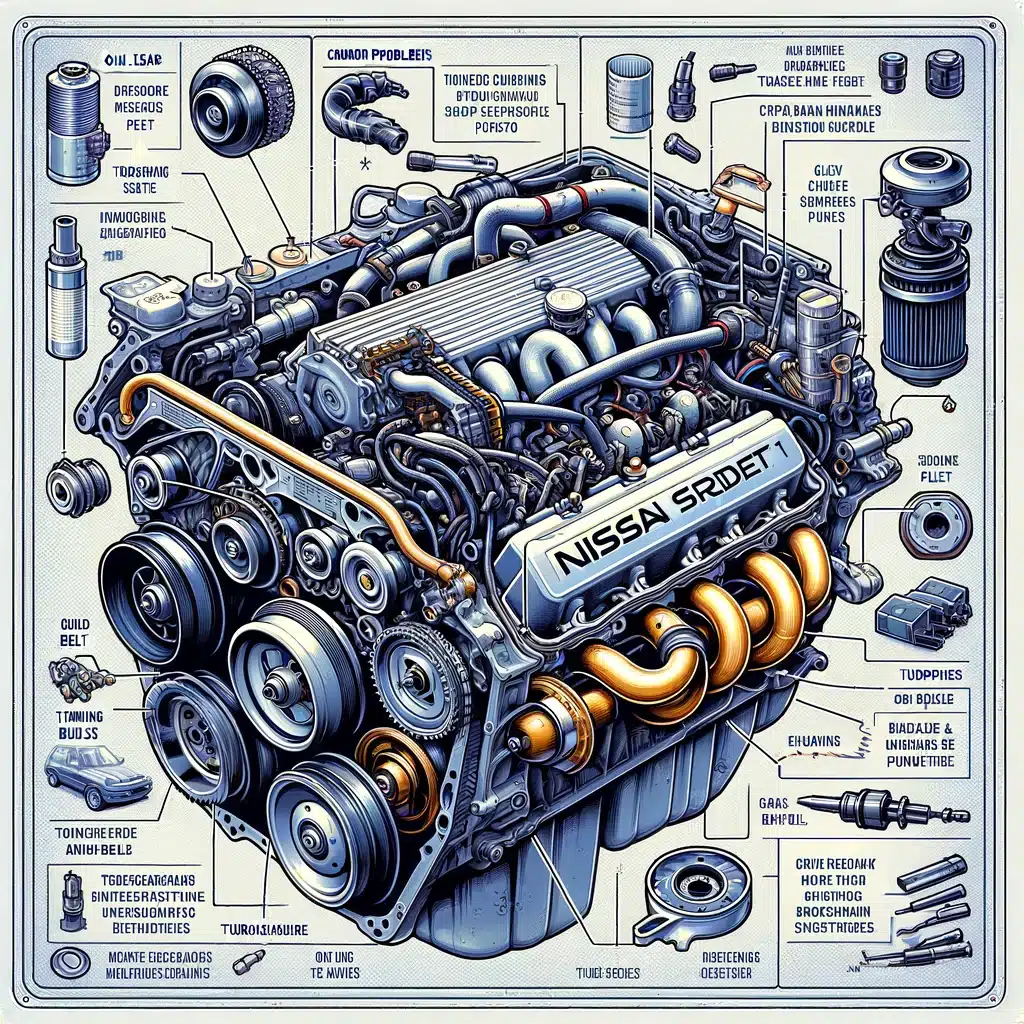
The Nissan SR20DET engine is a paragon of Japanese engineering, but like any mechanical workhorse, it is not without its susceptibilities. Understanding these common issues can ensure a swift response to prevent further damage.
| Problem | Symptoms | Check for faulty seals and gaskets and replace them as needed |
|---|---|---|
| Turbocharger Failure | Whining noise, loss of power, excessive exhaust smoke | Inspect turbocharger for damage, replace if necessary |
| Oil Leaks | Oil spots under the car, burning oil smell | Inspect the timing chain and tensioner. Replace if worn |
| Timing Chain Wear | Rattling noise from the engine, erratic engine performance | Check for coolant leaks and ensure the radiator and water pump are functioning |
| Worn Spark Plugs | Misfires, rough idling, decreased fuel economy | Check for faulty seals and gaskets and replace as needed |
| Overheating | High engine temperature reading, coolant loss | Replace spark plugs and check for the correct gap setting |
Signs of SR20DET Engine Wear and Failure
The SR20DET engine wear and failure signs often manifest through performance dips or unusual noises. If the turbocharger begins to fail, you may notice a distinct whining sound as the engine revs, along with a noticeable drop in power. This can be accompanied by blue or grey exhaust smoke if oil starts to burn within the turbo.
Oil leaks from the SR20DET are commonly due to age-related degradation of seals and gaskets. Oil stains can typically be identified on the ground where the car is parked or a smoky odor emanating from the engine area as oil drips onto hot surfaces.
The timing chain, robust as it is, can stretch or wear over time. A telltale rattling noise, particularly on cold starts, can indicate it’s time for inspection and possibly replacement.
Spark plugs are the workhorses of engine combustion, and when they wear out, you might experience engine misfires or a general lack of smoothness in how the engine runs. Ensuring they are replaced periodically is key to maintaining engine performance.
Overheating can signal multiple issues, ranging from coolant leaks to a malfunctioning water pump or a clogged radiator. It’s crucial to address overheating promptly to avoid more serious engine damage.
By watching for these common issues and undertaking routine maintenance, you can help ensure your SR20DET runs efficiently and effectively for years to come.
Maintenance Essentials
The Nissan SR20DET, celebrated for its performance and durability, demands meticulous attention to maintenance to preserve its legendary status. Adherence to maintenance essentials ensures the longevity of this high-performance engine.
SR20DET Oil Capacity and Recommended Oil Types
The lifeblood of the SR20DET engine is its oil, with the capacity ranging from 3.5 to 4.5 quarts (3.3 to 4.2 liters) depending on the specific model and the oil filter used.
For optimal performance, using the right oil type is crucial. High-quality synthetic oils are commonly recommended for turbocharged engines like the SR20DET due to their superior thermal stability and ability to protect against high-temperature wear.
A common viscosity rating for the SR20DET is 10W-30 for general use, but this can vary based on climate and the engine’s performance level. It’s advisable to consult the vehicle’s manual or a professional to determine the ideal oil type for your specific conditions.
Timing Belt or Chain: SR20DET Maintenance Insights
The SR20DET engine utilizes a timing chain rather than a belt. Timing chains are known for their durability and typically last longer than belts. However, they are not immune to wear and tear. Regular inspections are necessary, especially for the chain tensioners and guides, which may require replacement to prevent potential engine timing issues.
A well-maintained timing chain system is key to the engine’s health, as it synchronizes the crankshaft and camshaft rotation, ensuring the valves open and close at the correct times during the combustion cycle.
SR20DET: Interference Engine or Non-Interference?
The SR20DET is an interference engine. This means that the space between the pistons and valves is such that they can collide if the timing chain fails, potentially causing significant engine damage. This design allows for closer tolerances and higher compression ratios, contributing to the engine’s performance.
However, it also underscores the importance of timely maintenance of the timing chain and related components.
What is the Difference Between SR20DET and SR20DE Engines?
The SR20DET and SR20DE are both part of Nissan’s SR series of engines, but they differ significantly in terms of performance and design:
- Turbocharging:
- SR20DET: The “T” in SR20DET stands for turbocharged. This engine has a turbocharger and an intercooler, significantly increasing the horsepower and torque output compared to its naturally aspirated counterpart.
- SR20DE: The SR20DE is a naturally aspirated engine, meaning it does not have a turbocharger. Its performance figures are more modest because it relies solely on atmospheric pressure for its air intake.
- Power Output:
- SR20DET: Due to the forced induction from the turbocharger, the SR20DET outputs more power. The exact figures can vary depending on the specific vehicle model and market, but it generally produces between 205 to 250 horsepower.
- SR20DE: The SR20DE, without the assistance of a turbocharger, typically generates between 140 to 165 horsepower.
- Internal Components:
- SR20DET: The engine is equipped with stronger internal components, such as pistons, rods, and a crankshaft, that are designed to withstand the additional stress of turbocharging.
- SR20DE: The SR20DE has internals that are optimized for a naturally aspirated setup. They are durable but not as robust as those in the SR20DET.
- Compression Ratio:
- SR20DET: This engine has a lower compression ratio (ranging from 8.5:1 to 9.5:1) to accommodate the added air and fuel mixture that the turbocharger provides.
- SR20DE: The SR20DE has a higher compression ratio since there is no turbocharger to increase the air density in the combustion chamber.
- ECU and Fuel Management:
- SR20DET: It typically comes with a different Engine Control Unit (ECU) programming to manage the fuel and air mixture under turbocharged conditions, optimizing performance.
- SR20DE: The ECU and fuel management system are designed for a naturally aspirated engine, prioritizing efficiency and reliability at a lower power output.
- Applications:
- SR20DET: Commonly found in performance-oriented vehicles and is often used in motorsport applications due to its high power potential.
- SR20DE: Typically used in everyday passenger vehicles requiring less power and prioritizing fuel efficiency.
Fuel Efficiency and Consumption
The Nissan SR20DET, renowned for its turbocharged performance, is not primarily known for fuel efficiency; however, understanding its consumption rates and how to optimize them is beneficial for both performance enthusiasts and daily drivers alike.
Fuel Consumption Rates: SR20DET MPG Facts
Fuel efficiency for the SR20DET engine can vary widely based on several factors, including driving habits, the state of engine tune, and vehicle condition. On average, you might expect an SR20DET to achieve somewhere between 20 to 25 miles per gallon (MPG) in mixed driving conditions.
It’s worth noting that these figures can drop significantly in a performance driving scenario, where the engine is pushed to higher RPMs and the turbocharger is in constant use.
Maximizing Your SR20DET’s Fuel Economy
To maximize fuel efficiency in an SR20DET-powered vehicle, consider the following tips:
- Regular Maintenance: Keep the engine running efficiently with regular oil changes, air filter replacements, and spark plug inspections. Clean fuel injectors also ensure optimal fuel delivery.
- Proper Tire Inflation: Under-inflated tires can lead to increased rolling resistance, which the engine must work harder to overcome, reducing fuel economy.
- Conservative Driving: Aggressive acceleration and high-speed driving can deplete fuel rapidly, especially with a turbocharged engine. Smooth acceleration and adherence to speed limits can improve MPG.
- Weight Reduction: Remove unnecessary weight from the vehicle to reduce the amount of energy needed for acceleration.
- Aerodynamics: Install aerodynamic components or avoid adding non-aerodynamic accessories that can create drag.
- Upgrade Wisely: Performance upgrades like a more efficient turbocharger, exhaust systems, and engine management tuning can sometimes improve fuel economy if they are optimized for that purpose.
Following these tips and maintaining a consistent maintenance schedule can help ensure your SR20DET engine runs with high performance and as efficiently as possible, given its power-focused design.
Ignition and Electrical Components
Maintaining the ignition and electrical components of the Nissan SR20DET is crucial for optimal engine performance and longevity. The spark plugs and ignition timing are pivotal elements in this regard, directly influencing engine efficiency and power output.
Spark Plugs and Gap Settings for the SR20DET
The SR20DET engine requires high-quality spark plugs to handle the increased demands of turbocharging. It’s typically recommended to use iridium or platinum plugs due to their durability and ability to withstand high temperatures.
The correct spark plug gap for the SR20DET is usually around 0.8mm to 1.1mm, but this can vary based on specific engine modifications and the type of spark plug used. It’s essential to adhere to the recommended gap settings to prevent misfires, incomplete combustion, and potential damage to the turbocharger.
A correctly gapped spark plug ensures that the spark is strong enough to ignite the air-fuel mixture efficiently, which is particularly important in a forced induction engine where the mixture is denser. Regular checks and adjustments to the spark plug gap can help maintain engine performance and fuel efficiency.
Optimal Ignition Timing for Peak Performance
Ignition timing in the SR20DET is another critical factor for maximizing engine performance. Optimal ignition timing can vary depending on factors such as fuel quality, altitude, and whether the engine has been modified. Generally, the timing should be set so that the spark plug fires a fraction of a second before the piston reaches the top of its compression stroke.
For the SR20DET, advancing the timing can increase power and throttle response, but too much advance can lead to knocking or pinging, which is harmful to the engine. Conversely, retarding the timing can prevent knocking but may also reduce engine power and efficiency. It’s often best to use a high-quality timing light and consult with a professional tuner to set the timing correctly, especially if the engine has been modified.
Regular maintenance of spark plugs and careful calibration of ignition timing are essential practices for any SR20DET owner looking to extract the maximum performance and reliability from their engine.
Cooling and Filtration
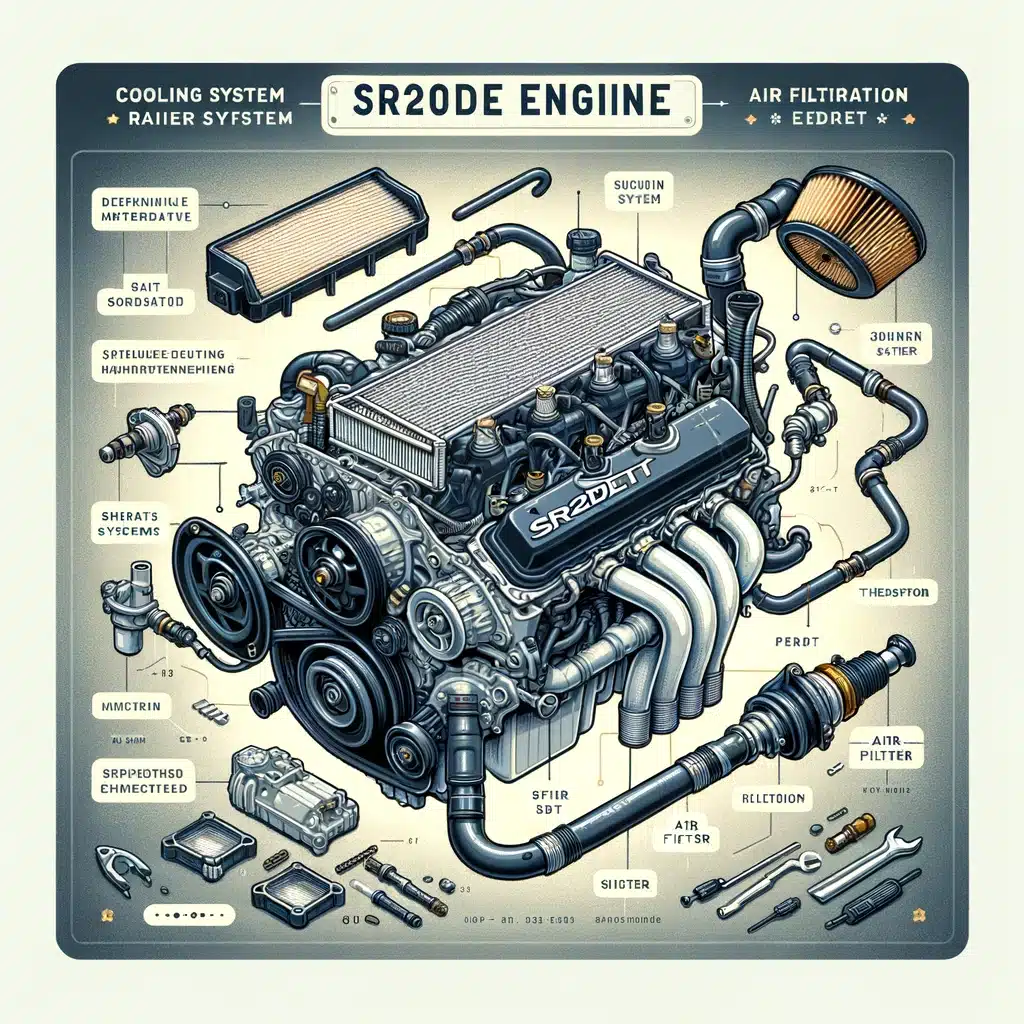
Effective cooling and filtration are paramount for the SR20DET engine’s performance and longevity. Here are the key specifications and considerations for the engine coolant and air filter.
Engine Coolant Specifications for SR20DET
The SR20DET engine requires a coolant that can withstand high temperatures without boiling over, especially under turbocharged stress. Below is a table detailing the specifications for the SR20DET’s cooling system:
| Component | Specification |
|---|---|
| Coolant Type | Ethylene glycol-based with anti-corrosive properties |
| Coolant Capacity | Approximately 6.9 quarts (6.5 liters) |
| Change Interval | Every 40,000 miles or 2 years, whichever comes first |
| Thermostat Opening Temperature | 76-80°C (169-176°F) |
- Regular Coolant Checks: Check coolant levels regularly and inspect for leaks.
- Coolant Flush: Perform a coolant flush at recommended intervals to prevent corrosion and buildup.
- Quality Coolant: Use a high-quality coolant that meets Nissan’s specifications to ensure proper heat dissipation.
Choosing the Right Engine Air Filter for SR20DET
The air filter is a critical component that ensures clean air reaches the engine, preventing abrasive particulate matter from causing wear.
- Filter Type: High-flow air filters are recommended for performance applications, whereas standard filters suit regular driving conditions.
- Material: Cotton or synthetic filters that can be cleaned and reused offer longevity and performance benefits over paper filters.
- Fitment: Ensure the air filter fits snugly to avoid unfiltered air entering the engine.
Maintenance Tips:
- Regular Inspection: Check the air filter every 15,000 miles or once a year.
- Clean or Replace: Clean reusable filters according to the manufacturer’s instructions or replace disposable ones when dirty.
- Performance Consideration: For modified engines, consider performance filters that can handle increased airflow demands.
Maintaining the cooling system and air filtration in the SR20DET is crucial to ensure that the engine runs at optimal temperatures and with clean air, supporting overall engine health and power delivery.
FAQs
What is the best oil for an SR20DET engine?
The best oil for an SR20DET engine is generally a fully synthetic 10W-30 for most climates. Synthetic oil provides better high-temperature resistance and lubrication for the turbocharged engine. However, the weight and formulation may vary depending on your specific use case (such as racing or cold weather). Refer to the owner’s manual or consult a performance specialist for your application.
How often should I change the spark plugs on an SR20DET?
Spark plugs on an SR20DET should typically be changed every 20,000 to 25,000 miles. However, this interval can be shorter if the engine is tuned for higher performance or is driven aggressively. Inspecting the spark plugs during regular maintenance will better indicate their condition and if they need replacing sooner.
What are the signs of a failing SR20DET timing chain?
Signs of a failing SR20DET timing chain include a rattling noise from the front of the engine, especially on startup, which may quiet down as the engine reaches operating temperature. Other symptoms can include engine misfires poor performance, and the engine may fail to start in severe cases. If you suspect the timing chain is failing, it must be inspected immediately to avoid potential engine damage.
Can I use regular unleaded fuel in my SR20DET?
The SR20DET engine was designed to perform optimally on premium unleaded fuel due to its higher octane rating, which helps prevent knock, especially in turbocharged engines. Using regular unleaded fuel can reduce performance and potentially cause engine knock, which can be damaging. Using the octane rating specified by Nissan is recommended for the best performance and engine health.
How can I improve my SR20DET’s horsepower? Improving the horsepower of an SR20DET can be achieved through various modifications, such as upgrading the turbocharger, installing a larger intercooler, using a performance exhaust system, and optimizing the engine with a programmable ECU.
Additionally, ensuring the engine is well-maintained with proper tuning and supporting modifications (such as upgraded fuel injectors and pumps) will help achieve higher performance levels. Planning upgrades holistically is advisable to ensure component compatibility and engine reliability.
Summary of Key Points
- Performance: The SR20DET’s turbocharged configuration offers a substantial power output, ranging between 205 to 250 horsepower, depending on the variant and setup.
- Design: With an interference engine design and a timing chain setup, the SR20DET is built for durability but requires mindful maintenance to prevent catastrophic damage.
- Maintenance: Key aspects of upkeep include regular oil changes with high-quality synthetic oil, timely replacement of spark plugs, and ensuring the timing chain and its components are in good condition.
- Fuel Efficiency: While not known for being the most fuel-efficient, proper driving habits and maintenance can help improve the SR20DET’s fuel economy.
- Upgrades: A wide range of performance upgrades are available for those looking to enhance horsepower and torque, but these should be balanced with reliability considerations.
The Importance of Regular Maintenance for SR20DET Longevity
Regular maintenance is the cornerstone of ensuring the SR20DET’s longevity and reliability. Each component, from the turbocharger to the spark plugs, plays a critical role in the engine’s overall health. Adhering to scheduled service intervals, using recommended fluids and parts, and addressing issues promptly not only extend the engine’s life but also maintain its performance.
The SR20DET thrives on attention to detail. A well-maintained engine is less likely to encounter unexpected failures and is more prepared to handle daily driving and performance tuning demands. By investing time and care into regular maintenance, enthusiasts can enjoy the full potential of the SR20DET, preserving its legacy for future generations of drivers and tuners alike.

